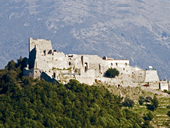- Salerno
Salerno was the birthplace of the "Schola Medica Salernitana" in the ninth century, which was the most important source of medical information in Europe at the time, and provided an important impulse to medical learning in Europe.
In recent history the city hosted the King of Italy, who moved from Rome in 1943 after Italy negotiated a peace with the Allies in World War II. A brief so-called "government of the South" was then established in the town, that became the "capital" of Italy for some months. Some of the Allied landings during Operation Avalanche (the invasion of Italy) occurred near Salerno.
Today Salerno is an important cultural centre in Campania and Italy and has had a long and eventful history. The city has a rich and varied culture, and the city is divided into three distinct regions: the medieval sector with a modern state-of-the arts area, the planned 19th century district and the more densely-populated post-war area, with its several apartment blocks.
Salerno is an ideal stopping off point on the way to Paestum, Pompeii or Positano, or the Cilento and Vallo di Diano National Park, which is a lesser known UNESCO World Heritage site. Placed as it is at one end of the Amalfi Coastline, it is an important passing point for the local tourism scene.
Gallery









